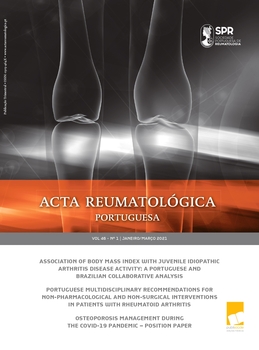Portuguese multidisciplinary recommendations for non-pharmacological and non-surgical interventions in patients with rheumatoid arthritis
Authors
Eduardo J. F. Santos; Catia Duarte; Ricardo J. O. Ferreira; Ana Margarida Pinto; Ana Moreira; Carlos Vaz; Catarina Aguiar Branco; Elsa Mateus; Helena Canhão; Inês Campos; Iolanda Barbosa; João Eurico Fonseca; José Canas da Silva; Maria Helena Mourão; Rui Costa; José A. P. da Silva;
Background: Patients with rheumatoid arthritis (RA) report significant levels of disease impact, which are improved, but not fully abrogated by immunosuppressive therapy, even when remission is achieved. This imposes the need for adjuvant interventions targeting the uncontrolled domains of disease impact. Non-pharmacological interventions are widely used for this purpose, but they have not been the object of professional recommendations or guidelines.
Objective: To propose multidisciplinary recommendations to inform clinical care providers regarding the employment of non-pharmacological and non-surgical interventions in the management of patients with RA.
Methods: The EULAR standardized operating procedures for the development of recommendations were followed. First, a systematic literature review was performed. Then, a multidisciplinary Technical Expert Panel (TEP) met to develop and discuss the recommendations and research agenda. For each developed recommendation i) the level of evidence and grade of recommendation were determined, and ii) the level of agreement among TEP members was set. A recommendation was adopted if approved by ≥75% of the TEP members, and the level of agreement was considered high when ≥8. All relevant national societies were included in this construction process to attain their endorsement.
Results: Based on evidence and expert opinion, the TEP developed and agreed on five overarching principles and 12 recommendations for non-pharmacological and non-surgical interventions in patients with RA. The mean level of agreement between the TEP members ranged between 8.5 and 9.9. The recommendations include a broad spectrum of intervention areas, such as exercise, hydrokinesiotherapy, psychological interventions, orthoses, education, general management of comorbidities, among others; and they set the requirements for their application.
Conclusions: These recommendations are based on the consensus judgment of clinical experts from a wide range of disciplines and patients’ representatives from Portugal. Given the evidence for effectiveness, feasibility and safety, non-pharmacological and non-surgical interventions should be an integral part of standard care for people with RA. It is hoped that these recommendations should be widely implemented in clinical practice. The target audience for these recommendations includes all health professionals involved in the care of patients with RA. The target patient population includes adult Portuguese people with RA.
Eduardo J. F. Santos
Catia Duarte
Ricardo J. O. Ferreira
Ana Margarida Pinto
Ana Moreira
Carlos Vaz
Catarina Aguiar Branco
Elsa Mateus
Helena Canhão
Inês Campos
Iolanda Barbosa
João Eurico Fonseca
José Canas da Silva
Maria Helena Mourão
Rui Costa
José A. P. da Silva
Catia Duarte
Ricardo J. O. Ferreira
Ana Margarida Pinto
Ana Moreira
Carlos Vaz
Catarina Aguiar Branco
Elsa Mateus
Helena Canhão
Inês Campos
Iolanda Barbosa
João Eurico Fonseca
José Canas da Silva
Maria Helena Mourão
Rui Costa
José A. P. da Silva





